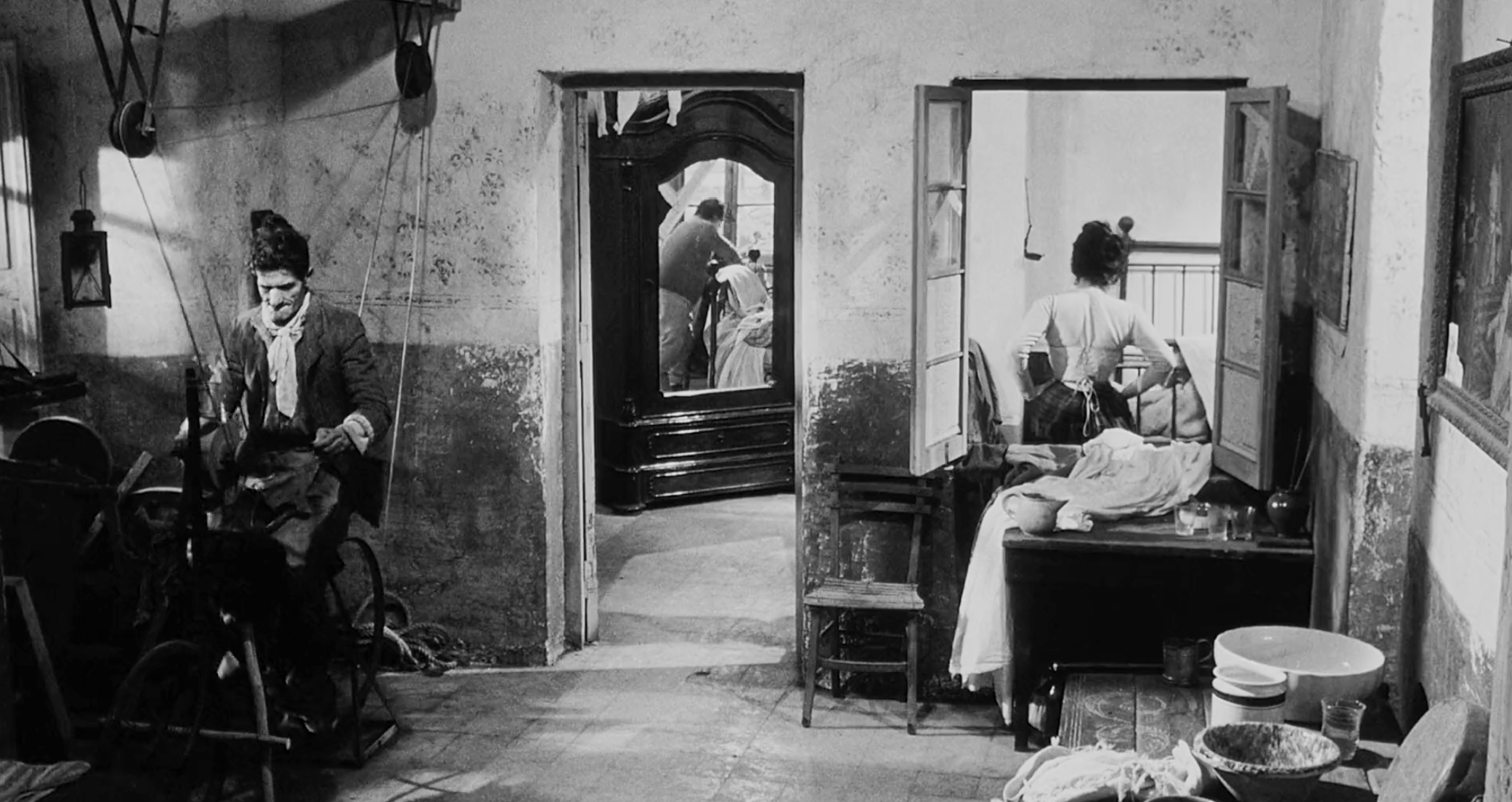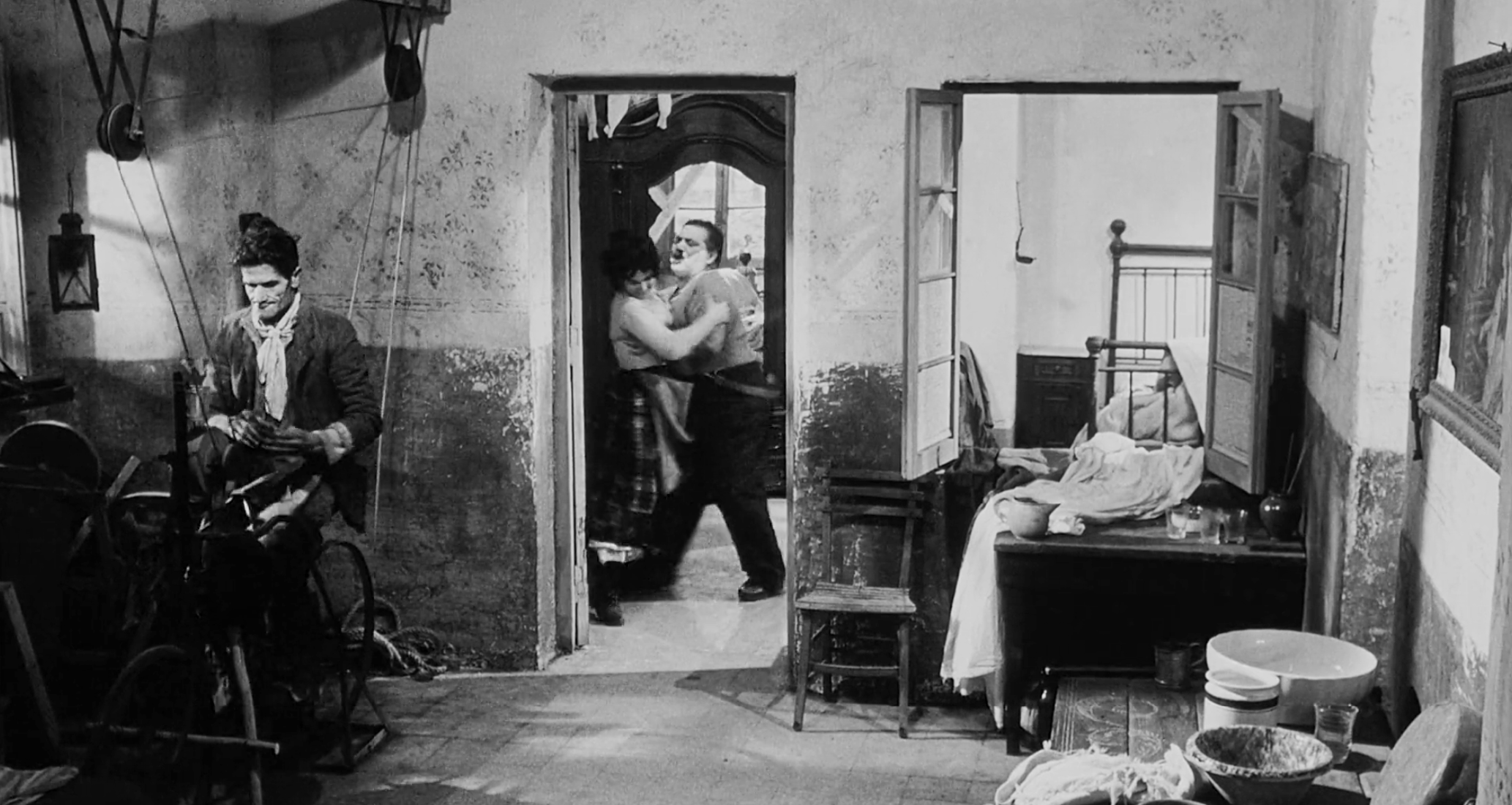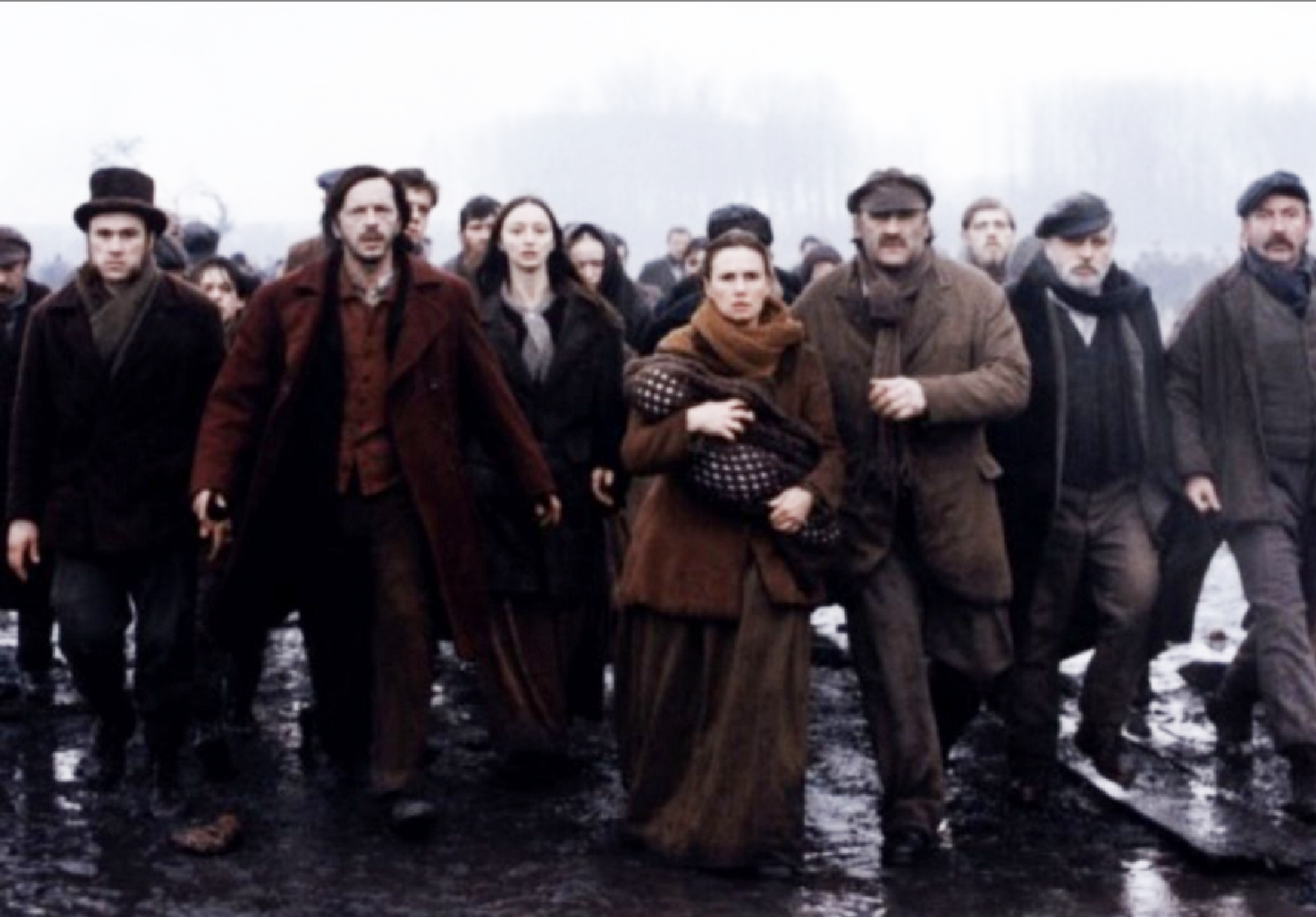Regia / Director: Mario Monicelli, 1963
Vestiti con il loro abito della domenica, i membri del comitato dello sciopero aspettano e aspettano, fuori dall'ufficio del direttore.
Dressed in their Sunday best, the strike committee waits and waits, outside the manager’s office.
Finalmente appare qualcuno: "Entrate".
"Meno male" – brontola Pautasso – "È passata un'ora".
At last, someone appears: “Come in.”
“Thank God,” Pautasso grumbles. “It’s been an hour.”
Entrano in fila silenziosamente, sotto lo sguardo fisso di tre direttori con baffi identici.
They file in quietly, under the steady gaze of three managers with identical mustaches.
Vedendo gli uomini togliersi il cappello, Cesarina li imita. Questi operai sono come pesci fuor d’acqua.
Seeing the men take off their hats, Cesarina follows suit. These workers are out of their league here.
Il nipote fa un cenno. "Avanti! Venite! Su, coraggio!" Si avvicinano con cautela. "Vi ho fatto aspettare un po’" – dice lui –"Ho avuto da fare".
The nephew beckons. “Come in! Come! Don’t be shy!” They approach cautiously. “I made you wait a little,” he says. “I had things to do.”
Giovialmente, continua: "Allora, eccoli qua i nostri sovversivi! Non avrete qualche bomba nelle tasche?" Tutti, tranne Martinetti, ridono. Mentre l'uomo continua a scherzare e a flirtare, gli operai rispondono innocentemente, con allegria.
Jovially, he goes on: “So! These are our subversives! You don’t have any bombs in your pockets, do you?” Everyone but Martinetti laughs. As the man continues joking and flirting, the workers respond innocently, with good cheer.
Seduto alla sua scrivania, il nipote tiene i lavoratori in piedi. "Questo è un lavoro che dà delle soddisfazioni" – dice – "anche se è un po' pesante. Ma voi pensate che le cose andrebbero meglio se fossimo un po' più indulgenti".
Il gruppo annuisce.
Seated at his desk, the nephew keeps the workers standing. “This work provides some satisfaction,” he says. “Even if it is a bit hard. But you feel things would be better if we were a bit more indulgent.”
The group nods.
Il nipote si rivolge ai suoi colleghi. "Signori, vogliamo togliere le multe a questi birbanti?"
Loro sono d'accordo.
Raggiante, il direttore aggiunge genialmente che ritirerà anche la sospensione di Pautasso e "così abbiamo posto fine a tutta la questione".
The nephew turns to his colleagues. “Gentlemen, shall we rescind the fines on these rascals?”
They agree.
Beaming, the manager adds genially that he’ll withdraw Pautasso’s suspension as well and “that way, we put an end to the whole matter.”
Si alza in piedi. "Va bene? Contenti?"
Perplessi, i compagni si guardano l'un l'altro.
He stands up. “Okay? Happy?”
Puzzled, the comrades look at one other.
Infine, Cesarina prende la parola: "Signor ingegnere, lasci che io le parli da uomo a uomo. Non possiamo tornare dai nostri amici con solo le briciole".
Dopo un breve silenzio, il nipote dice: "Guarda un po’. Se questo lo chiamate briciole, allora il discorso cambia".
Finally, Cesarina speaks up, “Sir, allow me to speak to you, man-to-man. We can’t go back to our colleagues with just some crumbs.”
After a brief silence, the nephew says, “Look here. If you call this crumbs, that changes everything.”
"Vi fate incantare da quel vagabondo" – continua con rabbia – "È venuto a intorbidare le acque e ha dei guai con la giustizia!"
Pautasso risponde: "Non è come lei dice, signor ingegnere".
“You are letting that vagrant bewitch you,” he continues, angrily. “He came to stir up the waters and he’s in trouble with the law!”
Pautasso responds, “It’s not the way you’re telling it, sir.”
"Ma voi che vi lagnate" – l'uomo si avvicina a loro – "Sapete quanti disoccupati ci sono in giro?" Alza un dito. "Tutta gente specializzata come voi, pronti a lavorare subito, e a condizioni inferiori alle vostre".
“Look, you whiners!” The man walks closer to them. “Do you know how many unemployed there are around here?” He jabs a finger. “All skilled people, like you, willing to work right now, and under worse conditions than yours.”
"Sono pronto a lasciare il passato alle spalle, ma dovete darmi una risposta entro domani. Se no, i disoccupati di Saluzzo sarebbero felici di saltare sul prossimo treno e correre qui".
“I’m willing to leave the past behind, but you must give me an answer by tomorrow. If not, the unemployed from Saluzzo will be happy to jump on the next train and run here.”
Un cambio di scena. Gli operai corrono a casa di Pautasso, urlando: "Vieni fuori!" Lui è dentro a radersi. "Il padrone ha mandato i crumiri!"
A change of scene. Workers come running to Pautasso’s house, calling, “Come out!” He’s inside shaving. “The boss has sent in the scabs!”
Pautasso va alla finestra. "I crumiri?! Boia!" Gli operai si avviano verso la stazione ferroviaria.
Pautasso goes to the window. “The scabs?! Damn!” The workers start for the train station.
Pautasso è già alla porta d'ingresso quando Adele urla: "Dove vai così in mutande?! Bestione ridicolo!" Lui si guarda. É vero! E ha anche la crema da barba ancora sulla faccia.
Pautasso is already at the front door when Adele calls, “Where are you going like that in your underwear?! Ridiculous beast!” He looks down at himself. It’s true! And he still has shaving cream on his face.
Ora, con i pantaloni indosso, Pautasso afferra un montante della testiera di ferro del letto, anche se Adele cerca invano di fermarlo. Suo zio, indifferente, continua ad affilare coltelli su una bicicletta montata su una piattaforma.
Now wearing pants, Pautasso grabs an iron bedpost, though Adele tries in vain to stop him. Her uncle, indifferent, keeps sharpening knives on a bicycle mounted on a platform.
Pautasso va al balcone. Qualcuno grida: "Dobbiamo fermarli allo scalo merci!"
Lui risponde: "Tu chiama il professore!"
Pautasso goes to the balcony. Someone yells, “We have to stop them at the freight yard!”
He shouts back, “Go get the Professor!”
In una scena di inquietante bellezza, il treno che porta i crumiri sfreccia attraverso il paesaggio invernale.
In a scene of eerie beauty, the train bringing the scabs speeds through the wintry landscape.
Alla stazione merci Pautasso dice a Cesarina di stare alla larga: "Qui può diventare pericoloso". Lei alza le spalle e si allontana.
At the freight yard, Pautasso tells Cesarina to stand clear: “It could get dangerous.” She shrugs and walks away.
"Perché pericoloso?" – chiede il professore – "Bisogna parlare, convincerli. È gente come noi". Scopre il montante del letto infilato nella giacca di Pautasso. "Cos'hai qui?"
"Legittima difesa!"
“Why dangerous?” asks the Professor. “We have to talk to them and convince them. They are people just like us.” He discovers the bedpost tucked into Pautasso’s jacket. “What do you have here?”
“For self-defense!”
Il professore lo getta via e il montante cade sul piede di un altro scioperante che urla.
The Professor tosses it aside and the post lands on the foot of another striker who howls.
Mani in tasca, Raoul commenta: "Parlare, parlare! Bisogna vedere se con le chiacchiere si convincono".
Martinetti risponde: "Non ti abbiamo chiesto di venire, bastian contrario".
Hands in his pockets, Raoul comments, “Talk, talk! We’ll see if talking changes their minds.”
Martinetti responds, “We didn’t ask you to come, Mr. Contrarian.”
Il treno fischia. "Eccoli!"
Sporgendosi dai finestrini, i crumiri vedono gli scioperanti in attesa.
The train whistle sounds. “Here they are!”
Leaning out of the windows, the scabs see the strikers waiting.
Il macchinista tira il freno. Una densa foschia si è depositata sul binario.
The engineer pulls the brake. A thick haze has settled over the track.
Dal treno in movimento, i crumiri guardano con ansia la linea degli scioperanti.
From the moving train, the scabs look anxiously at the line of strikers.
Il macchinista si sporge. "Via, levatevi! Sgomberate il binario! Via, disgraziati!"
The engineer leans out. “Out of the way! Clear the track! Out of the way, you bums!”
Ma nessuno si muove. Una donna tiene in braccio il suo bambino sulla traiettoria del treno. "Ma siete matti?!" dice il macchinista.
Questa inquadratura ci ricorda la scena di GERMINAL (Claude Berri, 1993) in cui i minatori di carbone francesi in sciopero negli anni 60 del 1800 affrontano i soldati, con Maheude – la moglie di un capo dello sciopero – in prima fila, con il suo bambino in braccio.
But no one budges. A woman holds up her baby in the path of the train. “Are you crazy?!” the engineer says.
This shot reminds us of the scene in GERMINAL (Claude Berri, 1993) where striking French coal miners in the 1860s confront soldiers, with Maheude – the wife of a strike leader – in front, holding her baby.
Sconfitto, ferma il treno e il professore si avvicina.
Defeated, he stops the train, and the Professor approaches.
Si rivolge agli uomini sul treno: "Amici! Compagni di Saluzzo! Non abbiamo nulla contro di voi! Ascoltateci! Siamo operai in sciopero".
He addresses the men on the train: “Friends! Comrades from Saluzzo! We don’t have anything against you! Listen to us! We're striking workers.”
Loro cominciano a prenderlo in giro. Imperterrito, lui cammina per tutta la lunghezza del treno, continuando a parlare. "Un momento! Siamo stati costretti a scioperare per difenderci. Per questo tutta questa gente fa sacrifici e fame!"
They start to jeer at him. Undaunted, he walks the length of the train, still talking. “A moment! We’ve been forced to strike to defend ourselves. That’s why all these people are sacrificing and starving!”
Un crumiro risponde: "La fame l’abbiamo anche noi. È un mese che non lavoriamo".
"Lo capisco. È proprio di questo che i padroni approfittano. Ma non potete aiutarli a nostre spese!"
A scab replies, “We’re starving too. We haven’t worked in a month.”
“I understand. That’s just what the bosses exploit. You can’t help them at our expense!”
Il lavoratore sul treno dice: "Voi non lavorate, noi non lavoriamo, quindi crepiamo di fame tutti? Chi ci guadagna?"
Saltando dai vagoni, gli uomini corrono verso la locomotiva, urlando: "Vai, macchinista, che questi vogliono bloccarci!"
The worker on the train says, “You don't work, we don't work, so we all starve together? Who gains from that?”
Jumping off the cars, men run toward the engine, yelling, “Go, Engineer, start the train! They’re trying to keep us out!”
Quando il professore interviene, lo colpiscono: "Vai via, predicatore!"
When the Professor intervenes, they strike him: “Beat it, preacher!”
In risposta, Raoul si getta nella mischia, gridando: "Ma in quanti vi mettete contro uno?" E ora è una vera e propria rissa: gli uomini saltano fuori dai finestrini del treno, mentre le donne lanciano sassi da una cresta.
At that, Raoul runs into the fray, shouting, “How many of you gang up on one guy?” And now, it’s a full-fledged brawl: men jump out of the train windows, while women throw rocks at them from a ridge.
Pautasso è vicino quando il macchinista mette in moto il treno.
Pautasso is nearby when the engineer starts up the train.
Grida: "No, fermo lì!" e corre nella nebbia accanto al treno.
He yells, “No, stop right there!” and runs through the haze beside the train.
Mentre si avvicina agli scambi incrociati, una voce avverte: "Arriva il diretto! Attento! Torna indietro, Pautasso!"
As he approaches the crisscrossing switches, a voice warns, “The express is coming! Look out! Come back, Pautasso!”
Lui guarda alla sua destra e alla sua sinistra, disorientato nella nebbia.
He looks to his right and to his left, disoriented in the fog.
Si mette a correre, poi alza lo sguardo e rimane immobile.
Si trova direttamente sulla traiettoria del treno.
He sets off running, then looks up and stands frozen in place.
He is directly in the path of the train.
Pautasso urla e alza le braccia mentre il treno si abbatte su di lui, il faro è l'ultima cosa che vede prima di lasciare questo mondo.
Pautasso screams and throws up his arms as the train bears down on him, its headlight the last thing that he sees before he leaves this world.
La macchina da presa fa una lenta panoramica della camera da letto di Pautasso, che è piena di persone in lutto. Anche Antonio, il giovane soldato, è lì. Pautasso è disteso sul letto.
The camera pans slowly around Pautasso’s bedroom, which is filled with mourners. Even Antonio, the young soldier, is there. Pautasso is laid out on the bed.
Due uomini si avvicinano a Porro. "Siamo della fabbrica del gas. A chi li do questi?"
"Ci pensa la Cesarina".
Le dicono: "È tutto quello che siamo riusciti a fare, un po’ di soldi".
"Almeno è qualcosa”.
Two men approach Porro. “We’re from the gas works. Who do we give this to?”
“Cesarina is taking care of it.”
They tell her, “It’s all we could manage to do, a little money.”
“At least It’s something.”
Addolorato, Martinetti dice: "Era quasi meglio se noi..." Non finisce.
Seduta accanto a lui, Bianca si lamenta con suo fratello: "Lui ha ragione. Da quando è arrivato quel professore non sono capitati altro che guai".
Grieving, Martinetti says, “It probably would have been better if we –” He doesn’t finish.
Sitting next to him, Bianca complains to her brother, “He’s right. Since that professor showed up, there’s been nothing but trouble.”
Omero abbassa lo sguardo. Lei continua: "E in più, quelli di Saluzzo hanno portato via i vostri posti".
Lui si volta verso di lei: "Sei una stupida. Non capisci niente".
Omero looks down. She goes on, “Plus, the Saluzzo people took away your jobs.”
He turns to her: “You’re an idiot. You don’t understand anything.”
Raoul arriva e rende omaggio a Pautasso, facendosi il segno della croce.
Raoul arrives and pays his respects to Pautasso, crossing himself.
Poi cammina attraverso l'appartamento fino a trovare Adele, che siede da sola, piangendo.
Then he walks through the apartment until he finds Adele, who sits alone, weeping.
Lui si siede vicino a lei e le asciuga delicatamente una lacrima dalla guancia.
He sits close to her and gently wipes a tear from her cheek.
Finalmente lui parla. "Ho cercato tante volte di dirti una cosa, ma ho sempre sbagliato la maniera. E adesso ho sbagliato il momento".
"Dilla lo stesso".
Una voce li fa spaventare: "Ragazzi!" È il professore, alla porta d'ingresso.
At last he speaks. “I’ve tried so many times to tell you something, but I always did it the wrong way. And now I got the moment wrong.”
“Say it anyway.”
They are startled by a voice, “Boys!” It’s the professor, at the front door.
Quando entra, tutti gli occhi sono su di lui.
As he enters, all eyes are upon him.
Gli scioperanti gli si riuniscono intorno. "Cosa sono queste facce tristi? Non avete letto il giornale della sera? L’incidente ha rotto il cerchio di silenzio. Parole dure per i padroni!" Sembra contento. Legge ad alta voce: "L’ingegnere Buratti chiamato dal Prefetto".*
*Un rappresentante provinciale del Ministero dell'Interno.
The strikers gather around him. “Why all the sad faces? Haven’t you seen the evening newspaper? The accident has broken the ring of silence. Harsh words for the bosses.” He seems delighted. He reads aloud, “Factory manager Buratti summoned by the prefect.”*
*A provincial representative of the Interior Ministry.
"Cosa vuol dire?"
"Per evitare altri incidenti, il prefetto ha ordinato che i crumiri tornino indietro a Saluzzo. Ve lo dicevo che se resistevamo qualcosa sarebbe successo".
“What does that mean?”
“To prevent further accidents, the prefect has ordered that the scabs go back to Saluzzo. I told you that if we held out, something would happen.”
Ma Raoul dice: "Come no? Un morto è successo. Contento, no? Per lei ce ne vorrebbe uno alla settimana".
But Raoul says, “Sure! A man lost his life. Happy, right? For you, you’d want one a week.”
FINE PARTE VII
Here is Parte VIII of this cineracconto. Subscribe to receive a weekly email newsletter with links to all our new posts.







































































































